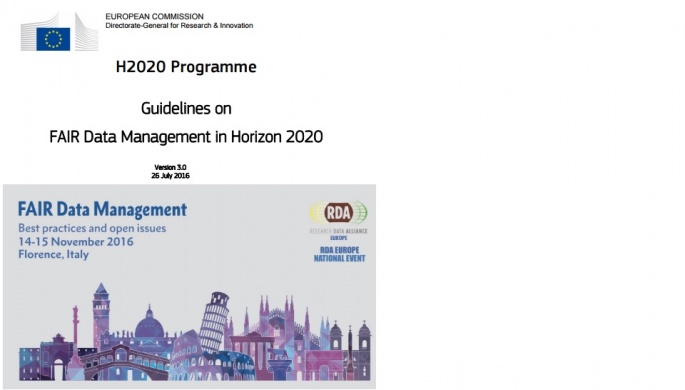FAIR Data Management. Towards the new era of Open Science


On 26 July 2016, the European Commission released new Guidelines on FAIR Data Management in Horizon 2020. The Guidelines place an emphasis on FAIR principles defined by FORCE 11 group. On 14 and 15 November 2016, Florence will host RDA National Event : FAIR Data Management. Best practices and open issues.
_________________________________________________________________________________________________
The revised Guidelines on FAIR Data Management in Horizon 2020 (Version 3.0) include several key changes, both related to the Open Research Data Pilot and to Data Management Plans (DMPs).
The first critical change is that a single DMP is to be produced for the whole research project, rather than one per dataset, as previously.
A new DMP template (added to DMPonline) contains 31 questions (listed in Annex I of the Guidelines) to be addressed to ensure the achievement of the FAIR data principles (Findable, Accessible, Interoperable and Re-usable data). To keep data FAIR, correct metadata, documentation and standards are fundamental.
An initial DMP needs to be submitted by month 6 (it is not required to provide detailed answers to all the questions in the first version).
The DMP is intended to be a “living document”, i.e. to be updated during the project lifetime. Subsequent versions of DMP should be produced whenever significant changes occur.
The other useful clarification regards costs related to open access to research data. These costs are eligible and can be claimed for reimbursement during the duration of the project under the conditions defined in the grant agreement.
From 2017 the Open Research Data Pilot applies to all H2020 projects and not only for research projects in specific fields. Consequently, researchers and the general public will have more knowledge freely available.
Projects will be able to choose which datasets should be made available for their specific context and when, and eventually change their decision along the implementation progresses (e.g., if projects discover there's a commerical application, then they may plan to file for a patent).
Although open research data will apply by default to all H2020 projects (see: ‘European Cloud Initiative – Building a competitive data and knowledge economy in Europe’), there is still the possibility to opt out to keep some datasets closed (consequently, to justify these decisions in your DMP).
In line with the innovative vision of the released Horizon 2020 Programme - Guidelines on FAIR Data Management, EUDAT (Research Data Services, Expertise & Technology Solutions) is ready to fully support your research lifecycle creating, processing, analyzing preserving, sharing and re-using data. As a first step, check out EUDAT B2SHARE, which includes a built-in license wizard that facilitates the selection of an adequate license for research data.
Echoing the importance of FAIR principles, the Research Data Alliance (RDA) - in collaboration with the universities of Turin, Milan, Bologna , Trento and Parma and supported by CNR, AISA, APRE and OpenAIRE - organizes a two-day (14-15 November, 2016) ‘RDA National Event in Italy: FAIR Data Management’ about sharing, reuse, and reproducibility of research data on few selected scientific fields - and related research infrastructures - of strategic relevance in Europe.
Among the solutions for implementing FAIR data management a key role will be covered by those developed by RDA Working and Interest Groups dealing with data reproducibility, metadata standards, data foundation and implementation of DMP in real scientific scenarios.
_________________________________________________________________________________________________
Related contents:
- Guidelines on Open Access to Scientific Publications and Research Data in Horizon 2020
- The European framework: Horizon 2020 and the Open research Data pilot
- Open Research Data as the default: Frequently Asked Questions about the extension of the Open Research Data Pilot
- The European Open Science Cloud will be a reality by 2020
- Data Management Plans
- Writing and implementing DMPs - Who should do what? What help is needed?
- Managing data and being open – useful resources to takeaway
- Open research data: creating bridges for Open Science (video, Open CON2015)
- Researchers have the power to change the way science is done and communicated
- My pledge to be open
- The culture of sharing
- How to make your paper open
- How to make your data open

